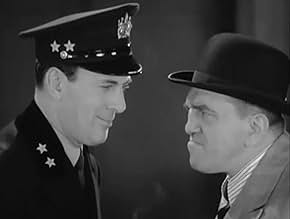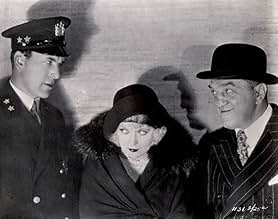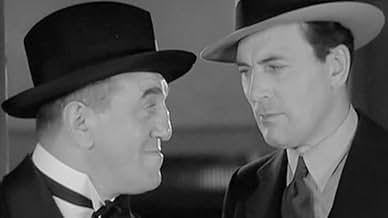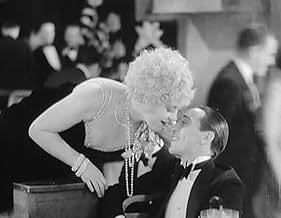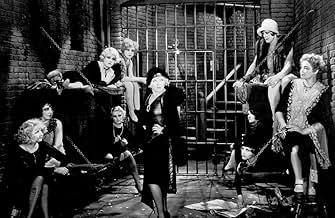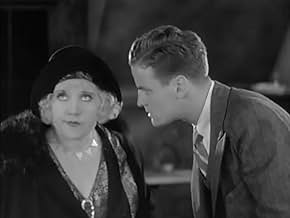IMDb RATING
6.6/10
1.8K
YOUR RATING
An honest police captain vows to bring down a powerful bootlegger who is protected by corrupt politicians and judges.An honest police captain vows to bring down a powerful bootlegger who is protected by corrupt politicians and judges.An honest police captain vows to bring down a powerful bootlegger who is protected by corrupt politicians and judges.
- Nominated for 1 Oscar
- 3 wins & 1 nomination total
G. Pat Collins
- Patrolman Johnson
- (as Pat Collins)
George E. Stone
- Joe Scarsi
- (as George Stone)
Sam De Grasse
- District Attorney Welch
- (as Sam DeGrasse)
Richard 'Skeets' Gallagher
- Miller
- (as Skeets Gallagher)
Frank Austin
- Man at Funeral
- (uncredited)
Jimmy Dime
- Rival Gang Lookout
- (uncredited)
Jim Farley
- Detective
- (uncredited)
Ruth Feldman
- Woman on stairs
- (uncredited)
Sherry Hall
- Orchestra Leader
- (uncredited)
Featured reviews
Lewis Milestone performed one of his best directing jobs with "The Racket." He had a superior cast in what, in a later talkie, might be just a mediocre script, but taken in context, "The Racket" is a great movie. Watch the byplay during the funeral, for example.
Milestone and his editors and special effects people create some excellent visual effects to complement a cast that charms even in the role of slimy bad guy. Minor characters still got their chances to shine in the spotlight and even the non-speaking -- well, of course all the characters were non-speaking in one sense -- the un-named characters whose job was to look menacing or even just interested in the goings-on, all stood out.
Frankly this film was a surprise to me -- not that it was so good, but that I had had no knowledge of it beforehand.
To come so early in the career of so many of the people connected with it, notably Howard Hughes, who had the (to me) strange title of "presenter," this film is a stand-out. Robert Israel, who wrote the music for this revival, is fast becoming one of the great composers of the modern era.
All the people who are responsible for this film's recent revival deserve the thanks of film lovers as well as film historians. "The Racket" is one to see again.
Milestone and his editors and special effects people create some excellent visual effects to complement a cast that charms even in the role of slimy bad guy. Minor characters still got their chances to shine in the spotlight and even the non-speaking -- well, of course all the characters were non-speaking in one sense -- the un-named characters whose job was to look menacing or even just interested in the goings-on, all stood out.
Frankly this film was a surprise to me -- not that it was so good, but that I had had no knowledge of it beforehand.
To come so early in the career of so many of the people connected with it, notably Howard Hughes, who had the (to me) strange title of "presenter," this film is a stand-out. Robert Israel, who wrote the music for this revival, is fast becoming one of the great composers of the modern era.
All the people who are responsible for this film's recent revival deserve the thanks of film lovers as well as film historians. "The Racket" is one to see again.
I watched this in anticipation of Josef von Sternberg's UNDERWORLD (1927), a film that revolutionized the gangster genre – which THE RACKET is as well (I am already familiar with its 1951 remake from the same producer, Howard Hughes). Playwright Bartlett Cormack helped adapt his own work to the screen; interestingly, the chief hoodlum during the original theatrical run was essayed by Edward G. Robinson – who would achieve movie stardom with a similar role in LITTLE CAESAR (1930)!
Though the original was nominated for the Best Picture Oscar, ultimately, I still think that the later version is superior (even if nominal director John Cromwell ended up getting replaced by Nicholas Ray!) – principally because there the antagonistic relationship at its core was formidably filled by Roberts Mitchum and Ryan! In this version, we have forgotten star Thomas Meighan as the quintessential (albeit over-age) Irish cop and burly but suitably smarmy Louis Wolheim (who would re-unite with director Milestone for his Oscar-winning masterpiece ALL QUIET ON THE WESTERN FRONT [1930]). From what I can recall, the plot is pretty much identical between the two versions (for the record, I own Warner's SE DVD of the 1951 movie, while the earlier one was restored for DVD release by Silent-movie specialists Flicker Alley but it somehow never hit stores!): the gangster not only muscles in on a rival (the entire mob's come-uppance in a speak-easy, during a party thrown in honor of Wolheim's younger brother no less, is superbly realized by Milestone) but even seems to have authority figures under his thumb (recalling in this way the recently-viewed THE GLASS KEY [1935], down to a car-accident-turned-murder-rap which sends a ripple through the already murky waters) – so that, no matter what he or his associates do, they are sure to get away scott-free!
In both, there is also a girl – pretty but spirited Marie Prevost in 1928, sultry-yet-dull Lizabeth Scott in 1951 – who first gets embroiled in the villain's schemes and, then, becomes a pawn in the protagonists' struggle for supremacy (which sees Meighan transferred to a precinct far removed from the center of activities and Wolheim tripping himself up by personally exacting revenge upon the cop who arrested his sibling). On the side-lines are a trio of reporters, two vaguely comical (though their antics only seem to exacerbate the feud between policeman and criminal!) and the other a rookie (who becomes involved with Prevost, and is actually the one to bring the villain to book) – his eventual demise, then, emerges to be heavily tinged with irony!
Though the original was nominated for the Best Picture Oscar, ultimately, I still think that the later version is superior (even if nominal director John Cromwell ended up getting replaced by Nicholas Ray!) – principally because there the antagonistic relationship at its core was formidably filled by Roberts Mitchum and Ryan! In this version, we have forgotten star Thomas Meighan as the quintessential (albeit over-age) Irish cop and burly but suitably smarmy Louis Wolheim (who would re-unite with director Milestone for his Oscar-winning masterpiece ALL QUIET ON THE WESTERN FRONT [1930]). From what I can recall, the plot is pretty much identical between the two versions (for the record, I own Warner's SE DVD of the 1951 movie, while the earlier one was restored for DVD release by Silent-movie specialists Flicker Alley but it somehow never hit stores!): the gangster not only muscles in on a rival (the entire mob's come-uppance in a speak-easy, during a party thrown in honor of Wolheim's younger brother no less, is superbly realized by Milestone) but even seems to have authority figures under his thumb (recalling in this way the recently-viewed THE GLASS KEY [1935], down to a car-accident-turned-murder-rap which sends a ripple through the already murky waters) – so that, no matter what he or his associates do, they are sure to get away scott-free!
In both, there is also a girl – pretty but spirited Marie Prevost in 1928, sultry-yet-dull Lizabeth Scott in 1951 – who first gets embroiled in the villain's schemes and, then, becomes a pawn in the protagonists' struggle for supremacy (which sees Meighan transferred to a precinct far removed from the center of activities and Wolheim tripping himself up by personally exacting revenge upon the cop who arrested his sibling). On the side-lines are a trio of reporters, two vaguely comical (though their antics only seem to exacerbate the feud between policeman and criminal!) and the other a rookie (who becomes involved with Prevost, and is actually the one to bring the villain to book) – his eventual demise, then, emerges to be heavily tinged with irony!
I am watching it right now on TCM. It has been digitally restored and a new soundtrack added. The music is excellent. I was sure it was 'period' until I saw the credits, which are rolling as I type.
Marie Prevost is amazing, she dominates every scene in which she appears. Her expressions and body language are astounding. It helps you understand what silent movie acting is all about.
This was a Howard Hughes production. I believe the picture is longer than 60 minutes, though.
The University of Nevada at Las Vegas is credited with this restoration project. They did a great job. I love this movie.
Marie Prevost is amazing, she dominates every scene in which she appears. Her expressions and body language are astounding. It helps you understand what silent movie acting is all about.
This was a Howard Hughes production. I believe the picture is longer than 60 minutes, though.
The University of Nevada at Las Vegas is credited with this restoration project. They did a great job. I love this movie.
As it has just been recovered and digitized by University of Nevada at Las Vegas and Turner Classic Movies along with the rest of Howard Hughes' classic silent movies, the people of today will finally get to see this great movie. A movie about prohibition and the mafia, made at the same time it was all going on. Idealizing the mafia before the Godfather was even thought of. Although it may be silent, it shows detail on the corruption of the mob with the police force and government officials, and not to mention the costumes of the film were obviously fitting for the time period, and used common "gangster" themes, such as the pinstriped suit with fedora and the cigar. The production quality is very good for the time, with what equipment they had to work with. The stereotypical choppiness of the frames from 20's movies rarely occurs, except when there is much fast action. Turner also did a good job digitizing this, as the film quality is still high. I recommend that people see this, albeit short, it gives a good idea about the movies of the times. Along with "Two Arabian Nights", also produced by Howard Hughes.
I found this a very enjoyable early crime drama. Students of the genre will want to compare this to "Little Caesar" and/or "The Front Page". Transitions within scenes and from one scene to another flow better in "The Racket" than in many other silent films.
I agree with earlier comments about the new scoring. There is too much brass and too much forte.
The film itself is about 83 minutes long, much longer than we thought during the 76 years that it was out of circulation. The restoration job on the film is one of the best that I have seen, especially for a film as old as this one is. I hope it is released soon on DVD.
I agree with earlier comments about the new scoring. There is too much brass and too much forte.
The film itself is about 83 minutes long, much longer than we thought during the 76 years that it was out of circulation. The restoration job on the film is one of the best that I have seen, especially for a film as old as this one is. I hope it is released soon on DVD.
Did you know
- TriviaOnly one copy of the film is known to have survived. It was long thought lost before being located in Howard Hughes' film collection after his death. The film was restored and preserved by the University of Nevada, Las Vegas film department. The restored copy is frequently shown on Turner Classic Movies in the US.
- GoofsMcQuigg's holster is embossed with his name and rank, but it also says CITY OF followed by a blank space.
- Quotes
Cub Reporter Ames: I told you not to look after me... Why did you do it?
Helen Hayes: Because - -- because you affect me like a mammy song.
- Alternate versionsIn 2004, The University of Nevada, Las Vegas and Flicker Alley, LLC copyrighted a new digital version with a new orchestral score composed, arranged and conducted by Robert Israel. It was produced by Jeffery Masino and runs 84 minutes.
- ConnectionsReferenced in Public Enemies: The Golden Age of the Gangster Film (2008)
- How long is The Racket?Powered by Alexa
Details
- Runtime1 hour 24 minutes
- Color
- Sound mix
- Aspect ratio
- 1.33 : 1
Contribute to this page
Suggest an edit or add missing content


